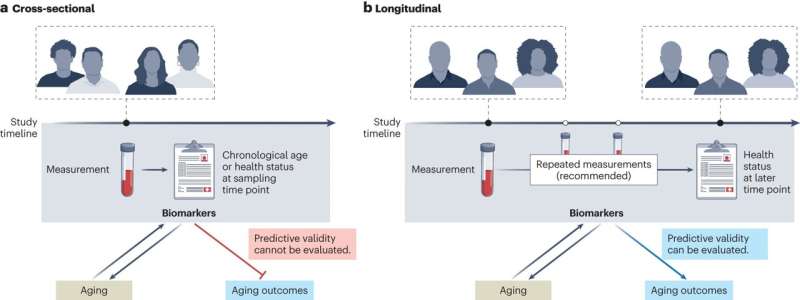This article has been reviewed according to Science X's editorial process and policies. Editors have highlighted the following attributes while ensuring the content's credibility:
fact-checked
trusted source
proofread
Study proposes framework to standardize biomarkers of aging and accelerate clinical use

Biomarkers are measurable characteristics that can be used to evaluate normal biological processes, diseases, or responses to treatment in patients. Using biomarkers to assess biological aging, or the increase in molecular and cellular damage over time, has recently gained popularity for its potential to predict longevity and quality of life. However, there are currently no guidelines for standardizing the development and validation of biomarkers of aging—a necessary process to ensure accurate and reliable outcomes in the clinic.
A new study led by investigators from Brigham and Women's Hospital has proposed a framework for future validation of aging biomarkers that could help translate them into clinically actionable tools.
The work is published in the journal Nature Medicine.
To do this, the team examined population-based cohort studies of blood-based biomarkers of aging built using omic data. Using this information, they identified challenges in comparing the predictive strength of biomarkers, such as variations in study design and data collection methods, as well as inherent differences in population-specific traits.
The authors then provided recommendations to address these difficulties. They suggest that "multi-omic approaches" involving different technologies like metabolomics, proteomics and epigenetics, and transcriptomics will provide greater insights into biomarker predictive performance. Instead of relying only on mortality as an aging-related outcome, the researchers advocate for the consideration of biomarker associations with other health factors like functional decline, frailty, chronic disease and disability. In addition, they recommend standardizing omic data to enhance validation efforts.
"Omics and biomarkers harmonization efforts, such as the Bio-learn project, are instrumental in validation of biomarkers of aging," said co-first author Mahdi Moqri, Ph.D., of the Division of Genetics.
The framework also encourages increased collaboration between research groups on large-scale, longitudinal studies that can track long-term physiological changes and responses to therapeutics in diverse populations. Further work is required to understand how implementation of biomarker evaluation in clinical trials might improve patient quality of life and survival.
"If we hope to have clinical trials for interventions that extend healthy lifespan in humans, we need reliable, validated biomarkers of aging," said co-first author Jesse Poganik, Ph.D., of the Division of Genetics. "We hope that our framework will help prioritize the most promising biomarkers and provide health care providers with clinically valuable and actionable tools."
More information: Mahdi Moqri et al, Validation of biomarkers of aging, Nature Medicine (2024). DOI: 10.1038/s41591-023-02784-9





















